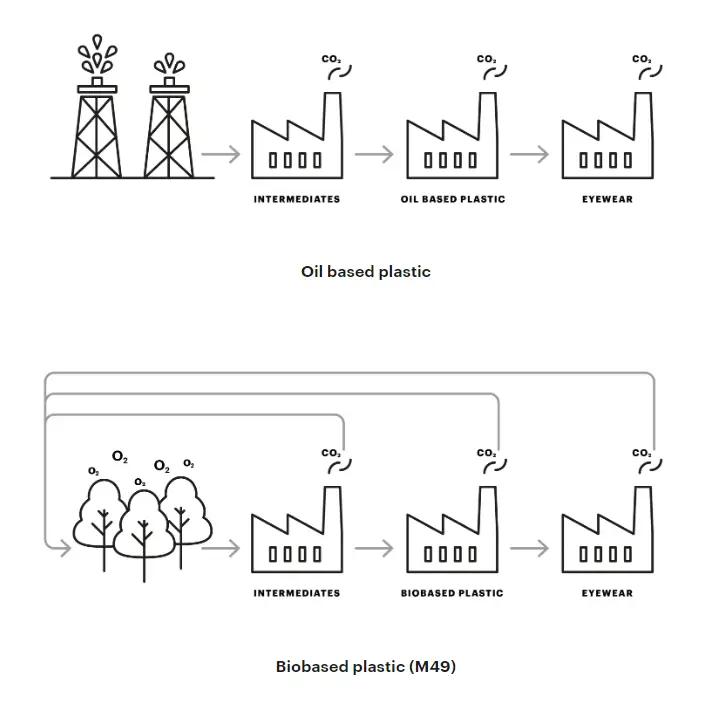Sustainable Sunglasses
- Know What To Look Out For

If you care about sustainability and you want to make the best purchasing decision possible for the planet, it helps to know what to look out for. Even if it is for something as simple as sunglasses.
- What are sustainable sunglasses made of?
- What should you look out for when buying sustainable sunglasses?
- What about second-hand sunglasses or reusing old frames?
What are sustainable sunglasses made of?
1. Recycled Plastics
- Does not use virgin materials, hence fewer carbon emissions compared with traditional plastic frames.
- Durable and made to last.
What’s not to like
- It is not biodegradable and can only be recycled a limited number of times.
- Rigid and difficult to produce curved frames.
Bio Acetate
- Made mostly from plant-based materials
- Plants used to make the frames can sequester carbon while growing
- Biodegradable (under certain conditions)
- Flexible, easy-to-produce curved frames
What’s not to like
- Cheaper models may use plants from non-renewable sources
- Production still involves the use of manufactured chemicals and substances
- Bio-degradable under industrial conditions – the time to biodegrade in landfill is unknown
Wood / Bamboo
- Can be renewable and sustainably produced, particularly if FSC certified
- Plants used to make the frames can sequester carbon while growing
- Lightweight
- May not be from FSC-certified forests or FSC-certification can not be trusted
- Not as durable or flexible
Recycled Metal
- Made from non-virgin resources hence lower carbon footprint than traditional metal frames
- Durable
- Often recyclable
- Recycled metals have a high carbon footprint when compared to other sustainable options
- It is not easy to recycle all metals (titanium for example)
What should you look out for when buying sustainable sunglasses?
- Frame materials are locally sourced
- Glasses are locally assembled
- Frames and lenses are high quality and likely to last
- Packaging is made from recycled materials
- Packaging is recyclable or compostable
- The brand is committed to sustainability as part of its operations
- There is a repair program
- There is a take-back program, ensuring the products are reused or recycled at the end of their life
What about second-hand sunglasses or reusing old frames?
Related FAQs:
Can sunglasses be made from recycled plastic?
Can sunglasses be made from recycled metals?
Are plant-based plastic sunglasses better for the environment?

Are bamboo sunglasses sustainable?
Which is better plastic or glass lenses?
After more information? You may be interested in....
Don’t Throw Them Away – Practical Uses for Your Old Glasses – if you have old eyewear, don’t trash it! Explore this guide, which covers options to repair, reuse and recycle glasses.
9 Sustainable Sunglass Brands Worth Checking Out – for a list of Australian brands making sunglasses from sustainable materials and a summary of the pros and cons of each.
Sustainable Choices for Your Eyewear – Your Options Covered – for information on reusing old frames and lenses and where to get glasses second-hand.
Replacing New Lenses in Your Old Frames – Is it Worth it? – for further information about getting new lenses into your existing frames, in particular, how much this will cost
7 Sustainable Eyewear Brands Worth Checking Out – for a list of Australian brands making prescription glasses from sustainable materials.
Plant-Based Sunglasses – What Are They Made From Really? – read this if you want to know what “plant-based” sunglasses really mean and what makes them a sustainable option.
A Close Look At Bamboo Sunglasses – Sustainable or Not? – for a great overview of bamboo as a material source, allowing you to judge whether it is a sustainable option or not.
Recycled Metal Sunglasses – From Waste to Wearable – discover the unusual source materials used in recycled metal sunglasses and the studies that show they are a sustainable option.




